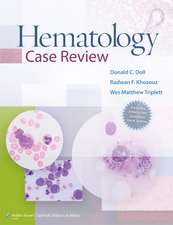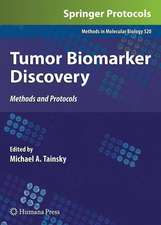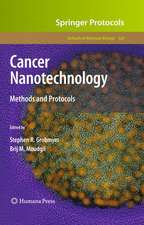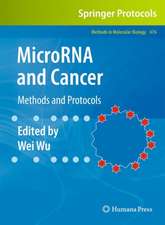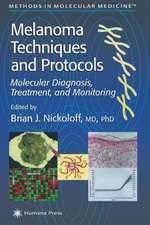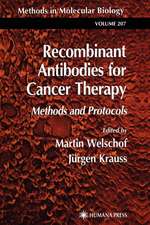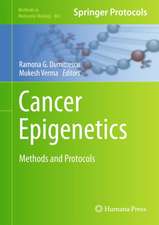Lung Cancer: Volume 2: Diagnostic and Therapeutic Methods and Reviews: Methods in Molecular Medicine, cartea 75
Editat de Barbara Driscollen Limba Engleză Hardback – 9 oct 2002
| Toate formatele și edițiile | Preț | Express |
|---|---|---|
| Paperback (2) | 794.88 lei 43-57 zile | |
| Humana Press Inc. – 16 aug 2013 | 794.88 lei 43-57 zile | |
| Humana Press Inc. – 19 aug 2013 | 808.62 lei 43-57 zile | |
| Hardback (2) | 1120.76 lei 43-57 zile | |
| Humana Press Inc. – 15 oct 2002 | 1120.76 lei 43-57 zile | |
| Humana Press Inc. – 9 oct 2002 | 1131.72 lei 43-57 zile |
Din seria Methods in Molecular Medicine
- 5%
 Preț: 1278.74 lei
Preț: 1278.74 lei - 15%
 Preț: 655.78 lei
Preț: 655.78 lei - 5%
 Preț: 1106.50 lei
Preț: 1106.50 lei - 5%
 Preț: 727.44 lei
Preț: 727.44 lei - 5%
 Preț: 1108.72 lei
Preț: 1108.72 lei - 15%
 Preț: 650.55 lei
Preț: 650.55 lei - 5%
 Preț: 735.66 lei
Preț: 735.66 lei - 18%
 Preț: 947.35 lei
Preț: 947.35 lei - 18%
 Preț: 948.92 lei
Preț: 948.92 lei - 5%
 Preț: 1114.54 lei
Preț: 1114.54 lei - 5%
 Preț: 1114.91 lei
Preț: 1114.91 lei - 15%
 Preț: 658.55 lei
Preț: 658.55 lei - 5%
 Preț: 734.01 lei
Preț: 734.01 lei - 5%
 Preț: 1111.61 lei
Preț: 1111.61 lei - 5%
 Preț: 1104.32 lei
Preț: 1104.32 lei - 5%
 Preț: 723.21 lei
Preț: 723.21 lei - 5%
 Preț: 1106.13 lei
Preț: 1106.13 lei - 5%
 Preț: 723.05 lei
Preț: 723.05 lei - 5%
 Preț: 1108.35 lei
Preț: 1108.35 lei - 5%
 Preț: 723.42 lei
Preț: 723.42 lei - 5%
 Preț: 1115.65 lei
Preț: 1115.65 lei - 5%
 Preț: 786.86 lei
Preț: 786.86 lei - 5%
 Preț: 1133.01 lei
Preț: 1133.01 lei - 5%
 Preț: 1114.71 lei
Preț: 1114.71 lei
Preț: 1131.72 lei
Preț vechi: 1191.29 lei
-5% Nou
Puncte Express: 1698
Preț estimativ în valută:
216.62€ • 235.38$ • 182.08£
216.62€ • 235.38$ • 182.08£
Carte tipărită la comandă
Livrare economică 21 aprilie-05 mai
Preluare comenzi: 021 569.72.76
Specificații
ISBN-13: 9780896039209
ISBN-10: 089603920X
Pagini: 816
Ilustrații: XXIII, 816 p.
Dimensiuni: 155 x 235 x 44 mm
Greutate: 1.35 kg
Ediția:2003
Editura: Humana Press Inc.
Colecția Humana
Seria Methods in Molecular Medicine
Locul publicării:Totowa, NJ, United States
ISBN-10: 089603920X
Pagini: 816
Ilustrații: XXIII, 816 p.
Dimensiuni: 155 x 235 x 44 mm
Greutate: 1.35 kg
Ediția:2003
Editura: Humana Press Inc.
Colecția Humana
Seria Methods in Molecular Medicine
Locul publicării:Totowa, NJ, United States
Public țintă
Professional/practitionerCuprins
Molecular and Genetic Aspects of Lung Cancer.- Detection of Altered Tumor Markers in Clinical Samples for Diagnosis and Prognosis.- Molecular Alterations in Lung Cancer.- Cellular Predictive Factors of Drug Resistance in Non-Small Cell Lung Carcinomas.- Clinical Implications of p53 Mutations in Lung Cancer.- An Epidemiologic and Clinicopathologic Overview of AIDS-Associated Pulmonary Kaposi’s Sarcoma.- Myeloperoxidase Promoter Region Polymorphism and Lung Cancer Risk.- Clinical Utility of Tumor Markers in the Management of Non-Small Cell Lung Cancer.- Detection of Chromosomal Aberrations in Lung Tissue and Peripheral Blood Lymphocytes Using Interphase Fluorescence In Situ Hybridization (FISH).- In Situ Analysis of Telomerase RNA Gene Expression as a Marker for Tumor Progression.- A High-Throughput Methodology for Identifying Molecular Targets Overexpressed in Lung Cancers.- Expression Profiling of Lung Cancer Based on Suppression Subtraction Hybridization (SSH).- Comparative Genomic Hybridization of Human Lung Cancer.- Sensitive Assays for Detection of Lung Cancer.- Fluorescent Microsatellite Analysis in Bronchial Lavage as a Potential Diagnostic Tool for Lung Cancer.- Southern Blotting of Genomic DNA from Lung and Its Tumors.- Assessment of Insulin-Like Growth Factors and Mutagen Sensitivity as Predictors of Lung Cancer Risk.- Comparative Multiplex PCR and Allele-Specific Expression Analysis in Human Lung Cancer.- Detection of K-ras Point Mutations in Sputum from Patients with Adenocarcinoma of the Lung by Point-EXACCT.- Detection of K-ras and p53 Mutations by “Mutant-Enriched” PCR-RFLP.- Detection of Small Cell Lung Cancer by RT-PCR for Neuropeptides, Neuropeptide Receptors, or a Splice Variant of the Neuron Restrictive Silencer Factor.- Utilization of ThyroidTranscription Factor-1 Immunostaining in the Diagnosis of Lung Tumors.- Molecular Biologic Substaging of Stage I NSCLC Through Immunohistochemistry Performed on Formalin-Fixed, Paraffin-Embedded Tissue.- A Sensitive Immunofluorescence Assay for Detection of p53 Protein in the Sputum.- SPR1.- Determination of Biological Parameters on Fine-Needle Aspirates from Non-Small Cell Lung Cancer.- Detection and Analysis of Lung Cancer Cells from Body Fluids Using a Rare Event Imaging System.- Reconstruction of Geno-Phenotypic Evolutionary Sequences from Intracellular Patterns of Molecular Abnormalities in Human Solid Tumors.- Novel Therapies.- Surgical Treatment of Lung Cancer.- Recent Advances and Dilemmas in the Radiotherapeutic Management of Locally Advanced Non-Small Cell Lung Cancer.- Photodynamic Therapy in Lung Cancer.- Gene Therapy for Lung Cancer.- Identifying Obstacles to Viral Gene Therapy for Lung Cancer.- Topical Gene Therapy for Pulmonary Diseases with PEI-DNA Aerosol Complexes.- Targeted Delivery of Expression Plasmids to the Lung via Macroaggregated Polyethylenimine-Albumin Conjugates.- Preparation of Retroviral Vectors for Cell-Cycle-Targeted Gene Therapy of Lung Cancer.- Aerosol Gene Therapy for Metastatic Lung Cancer Using PEI-p53 Complexes.- Clinical Development of Antisense Oligonucleotides as Anti-Cancer Therapeutics.- Antisense Oligonucleotides Targeting RI? Subunit of Protein Kinase A.- Use of Antisense Oligonucleotides for Therapy.- Induction of Programmed Cell Death with an Antisense Bcl-2 Oligonucleotide.- Tumor Vaccination with Cytokine-Encapsulated Microspheres.- Adoptive Immunotherapy.- Intratumoral Therapy with Cytokine Gene-Modified Dendritic Cells in Murine Lung Cancer Models.- Cyclooxygenase 2-Dependent Regulation of Antitumor Immunity in LungCancer.- Chemoprevention of Lung Cancer.- Assessing the Interaction of Particulate Delivery Systems with Lung Surfactant.- Chemopreventive Therapeutics.
Recenzii
"This is a good compilation of scientific information on lung cancer...it serves as a useful resource for scientists involved in lung cancer." -Doody's Health Sciences Book Review Journal
"The strongest part of the book is the detailed description of the different molecular techniques for marker analyses, which will be of great value for the lung cancer scientists working in basic science ant translational lung cancer research." -Annals of Oncology
"The strongest part of the book is the detailed description of the different molecular techniques for marker analyses, which will be of great value for the lung cancer scientists working in basic science ant translational lung cancer research." -Annals of Oncology
Textul de pe ultima copertă
Molecular-based laboratory methods can help significantly in the diagnosis and treatment of lung cancer, a leading cause of death worldwide. In Lung Cancer, Volume 2: Diagnostic and Therapeutic Methods and Reviews, leading physicians, scientists, and noted researchers describe step-by-step techniques for lung cancer diagnosis based on the molecular analysis of clinical samples. These experts review currently accepted treatments and outline a variety of novel therapies, including treatments based on gene therapy, immunotherapy, and chemoprevention, and show how these newly improved techniques can give a better appreciation of the prognosis associated with the particular mutation uncovered by the technique. These methods use a variety of molecular techniques, including the manipulation of gene expression and the alteration of immune status, to combat lung cancer. A companion volume, Lung Cancer, Volume 1: Molecular Pathology Methods and Reviews, illuminates the etiology of lung cancer and provides reliable techniques for detecting the responsible genetic mutations at the cellular, DNA, and protein levels.
Comprehensive and informative, Lung Cancer, Volume 2: Diagnostic and Therapeutic Methods and Reviews illuminates how molecular approaches can and are being applied to the diagnosis of lung cancer. Together, these two volumes constitute an unprecedented resource for those who wish to better understand how this disease is being diagnosed and treated, and what novel techniques may be available to improve both processes.
Comprehensive and informative, Lung Cancer, Volume 2: Diagnostic and Therapeutic Methods and Reviews illuminates how molecular approaches can and are being applied to the diagnosis of lung cancer. Together, these two volumes constitute an unprecedented resource for those who wish to better understand how this disease is being diagnosed and treated, and what novel techniques may be available to improve both processes.
Caracteristici
Includes supplementary material: sn.pub/extras


